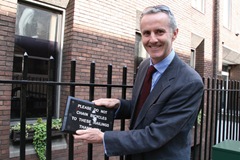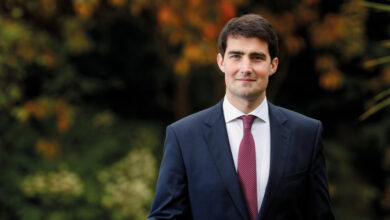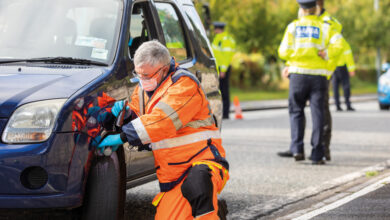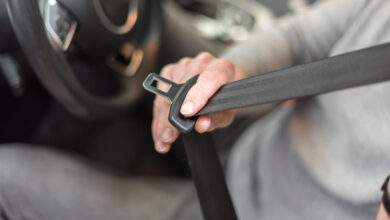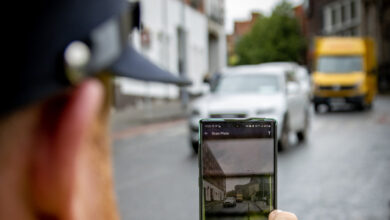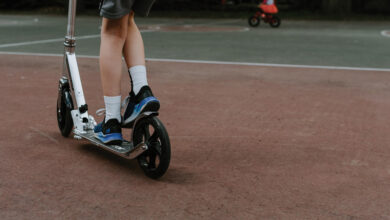Greening government: Ciarán Cuffe
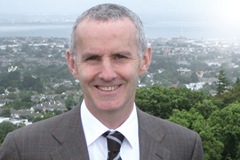 Reforming planning is Ciarán Cuffe’s main success to date as Sustainability Minister, he tells Peter Cheney. Working in government can prove unpopular but he prefers having the freedom to make hard choices.
Reforming planning is Ciarán Cuffe’s main success to date as Sustainability Minister, he tells Peter Cheney. Working in government can prove unpopular but he prefers having the freedom to make hard choices.
The laissez-faire planning policies of the past will end as the Planning Act is put into practice, according to Ciarán Cuffe.
“I think I can say without exaggeration that it is a significant and radical change of how we do planning in this country,” he comments after naming the Act as his main achievement in government. Cuffe was appointed as Minister of State in March.
The new law requires planning authorities to have an evidence-based core strategy within their development plan, which will end the “patchwork, over-ambitious re-zoning of large swathes of greenfield land.”
This, he predicts, will be good news for existing towns and villages and provide more certainty to developers and the wider community.
His background, as an architect and lecturer in planning, is particularly relevant to the post. Indeed, Cuffe’s election to Dublin City Council led to him returning to study for a masters in urban and regional planning.
“It seemed to me that planning decisions were being made for some of the most curious of reasons,” he recalls. “[It was] a real privilege and an opportunity to be in the hot seat when it came to taking the Planning Bill through the Oireachtas and I’m quite proud of it.”
Spread across three portfolios – transport, agriculture and the environment – his job is essentially “joining up the dots on sustainability”.
Within transport, he is refocusing capital funding towards public transport e.g. developing the Metro North and Dart Underground projects.
The Galway-Limerick and Dunboyne-Clonsilla tracks have been re-opened and he hopes to restore Waterford-Rosslare services through a ‘community rail partnership.’ This could involve community-owned vehicles on a state-owned track.
As for horticulture, he has just arrived from the National Organic Awards, where he highlighted the added export value for Irish produce. Ireland’s GM-free status is a particular selling point.
Some of his broader duties show sustainability’s wide scope.
In the next week, he would attend the Ospar convention in Oslo – a grouping of 15 governments with coasts on the North East Atlantic, with a remit to reduce marine pollution. On the other hand, he was also about to launch Dublin’s Open House architecture festival.
“Certainly, during the boom, we were much more interested in building quantity rather than quality,” he comments. “In the position I’m in now, it’s about ensuring that the quality is good and what we build is the right [use] in the right location, and is well built.”
Moving climate change legislation forward is his main aim over the next year, as it will provide a “stronger cross-government approach” to tackling the problem, and will conform to worldwide and European targets.
As he prepares to attend the Cancún talks, he wants Ireland to hold its head high. The carbon levy has been part of its response to climate change but he sees a further need for joined-up government in agriculture and transport. People need to understand that “in a sense carbon is a new currency and we need to make sure that the accounts are in good order.”
Presenting a Noise Bill is a pet project. Cuffe brought forward a private member’s Bill in November 2006, which passed its second stage and was referred to the Environment and Local Government Committee. It was “well-received” but fell before the 2007 general election.
The Bill’s aim will be to provide timely action on noise complaints. “There’s huge support from around the House on that legislation,” he remarks.
There’s no doubt that the Greens’ support has dropped since entering government. A 4.7 per cent share in 2007 fell to 2.3 per cent in last year’s local polls and 1.9 per cent in the European election. It now has just 30 elected representatives: 20 councillors, six TDs, three senators and a northern Assembly member.
“I think very often we’re trying to push a boulder uphill,” Cuffe reflects. “It’s tough. It’s tough being in government, being in government with Fianna Fáil, and being in government with Fianna Fáil during a prolonged recession.
“So every day of the week you have huge challenges but that’s the nature of government. You will never have everybody on your side.”
He points to the carbon levy, where Labour and Fine Gael sought opt-outs for “every special interest group going”. While he doesn’t blame either party, Cuffe warns that succumbing to vested interests results in “very weak” legislation.
“And I think, for the sake of the poorest on this earth, we need to have strong climate change legislation,” he adds.
When it is put to him that the party’s future does not look good, he admits that staying out of government forever could lead to “great numbers in the opinion polls” – but his focus is elsewhere.
“As I said earlier, it’s a real challenge, trying to make the right choices in difficult times. It would be easy to make more popular choices [rather] than make the right choices – and that’s probably what you see reflected in the polls.”
That said, he clearly enjoys the challenge.
“I spent 10 years of my life as a city councillor where you’re very often quite far away from where the decisions are made,” Cuffe says. “Once you’re in government, you’re in a much better position to actually influence the final decisions that are made in policy and in legislation.”
The job plays to his talents and Cuffe sums it up as “a great place” to make the policy choices that, he hopes, will “power us out of recession” sooner rather than later.
Profile points
• Born Shankill, Dublin, in 1963
• Dublin City councillor (1991-2003)
• TD for Dún Laoghaire since 2002
• Responsibility for horticulture, sustainable travel, planning and heritage
• Studied architecture and town planning at University College Dublin
• Lectured in urban planning at the Dublin Institute of Technology

